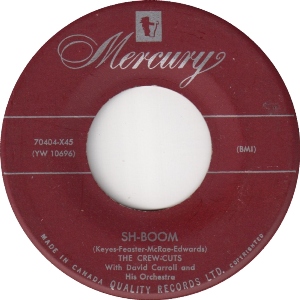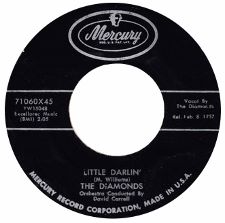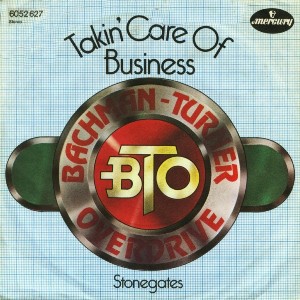| |
The Crew-Cuts

Sh-Boom / I Spoke Too Soon - 7"
Mercury - 1954
Michael Panontin
|
The Crew-Cuts owe their success in part to an obscure legal decision in a California court in 1950.
Supreme Records, a short-lived label based in Los Angeles had issued a record, 'A Little Bird Told Me' by Paula Watson, that was a sizeable chart success in 1948. That same year, Evelyn Knight issued a nearly identical version for the Decca label that topped the Billboard pop chart for seven weeks. Supreme sued Decca claiming that their arrangement of the song, which they argued was copyrightable, had been stolen by Decca. The courts ruled in favour of Decca, upholding a previous decision that arrangements cannot be copyrighted, thus opening the door for a decade of mostly white artists scoring huge hits with their copycat covers of lesser-known records, often by black vocal groups.
The Crew-Cuts specialized in exactly that: taking a black doo wop disc, recording a blanched version more palatable to white audiences and watching it climb the US charts. They used that formula to send a number of records up into the top twenty, including their biggest hits, 'Sh-Boom' in 1954 and 'Earth Angel' the following year, which scored #1 and #3 positions respectively on Billboard's pop chart.
Like their contemporaries the Four Lads, the Crew-Cuts had all been members of the St. Michael's Choir School in Toronto. The vocal quartet of baritone Rudi Maugeri, brothers John (tenor) and Ray Perkins (bass), and tenor Pat Barrett, originally started singing as the Four Tones in 1952. They were all gainfully employed with the Government of Ontario, but when a local deejay named Barry Nesbitt had them on his radio show, they decided to try their hands at singing full-time. After a name change to the Canadaires, the four started singing in clubs in and around the Niagara Falls area. They travelled to New York City to appear on Arthur Godfrey's popular TV and radio program Talent Scout and after finishing second were awarded a one-off record deal with the tiny Thrillwood label.
While performing in Sudbury ON the following year, they got an invitation to appear on a Cleveland TV program hosted by Gene Carrol. The guys hopped in a car and drove the 800+ kilometres in minus 40 degree temperatures to Ohio. There, they also met Bill Randle, a trailblazing radio deejay dubbed 'The Pied Piper of Cleveland'. Randle invited the boys onto his popular WERE-AM show, rechristened them the Crew-Cuts and even managed to arrange for an audition at Mercury Records. Mercury obviously liked what they heard and offered the Crew-Cuts a contract.
'Sh-Boom', with its impossibly euphoric opening line, "Life could be a dream / life could be a dream / doo doo doo doot sh-boom!", was originally written and recorded by an African-American sextet from the Bronx called the Chords. The word 'sh-boom' arose out of street corner slang at the time. "When they talked to each other, they'd say 'Hey, man, boom, how ya doin'," the Chords' second tenor Buddy McCrae explained. First tenor Jimmy Keyes added, "If you were standing on this block for five minutes, you'd hear that slang word fifteen times or more. We would take the 'boom' and make it sound like a bomb: 'shhhhhh-BOOM'."
The Chords issued their first record, a cover of Patti Page's 'Cross Over the Bridge', in April 1954. They recorded the song for an Atlantic subsidiary called Cat Records, who reluctantly allowed the group to include 'Sh-Boom' on the b-side. But when they realized that the Chords' composition was getting all the airplay, Cat rereleased the record in June with 'Sh-Boom' on the a-side (and their own 'Little Maiden' as the new b-side) and watched it fly to #3 on the R&B chart and #5 on the pop chart.
Mercury wasted little time recording the Crew-Cuts' version. Their Sh-Boom', which featured backing by David Carroll and His Orchestra, was issued in June 1954, just as the Chords' original was starting to peak. The Crew-Cuts' rendition may have traded some of the Chords' finger-snappin' ebullience for a bit of spit and polish, but it was even more successful, spending twenty weeks on the Billboard pop chart, nine of those at #1. It is often credited as being the first rock 'n' roll record to top the US charts.
They followed up with another cover, 'Earth Angel', a #1 R&B hit for the Penguins in 1954. Their rerecording shot up to #3 on the pop charts in 1955, and was equally successful across the pond, with the record reaching an impressive #4 spot in Britain. In fact, that year proved to be their busiest. The Crew-Cuts fired five more discs into the US top twenty, including covers of Gene and Eunice's 'Ko Ko Mo (I Love You So)', Dick Glasser's 'Angels in the Sky' and Nappy Brown's 'Don't Be Angry'.
The Crew-Cuts' career trajectory was steep, both up and down, and by early 1957 they had all but disappeared from the charts. Still, at the height of their success in the fall of 1955, the Crew-Cuts were flown across the Atlantic to entertain the Brits, who were hungry for the new rock 'n' roll sounds emanating from the US. In September, they were booked for a six-night stand at Liverpool's 2300-seat Empire Theatre. Among the many fans that week were a 12-year-old George Harrison and a 13-year-old Paul McCartney. "I was one of the boys at the stage door at the Empire in Liverpool, waiting for the Crew Cuts to come out," McCartney would tell Roger Ebert. "Do you remember them? They covered a lot of hits. And they talked to me. They gave me an autograph."
|
|
Suggestions

The Diamonds
Little Darlin' / Faithful and True - 7"
Mercury

Bachman-Turner Overdrive
Takin' Care of Business / Stonegates - 7"
Mercury
|








